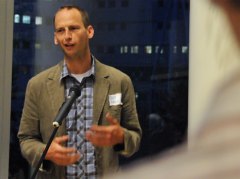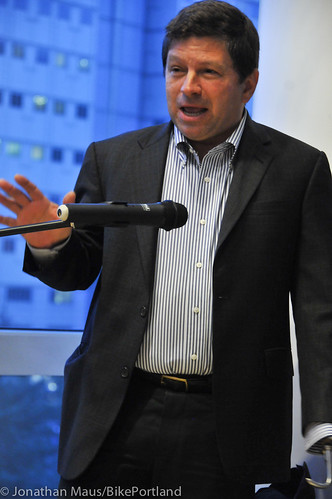“One of my goals in this job is to drive home just how expensive cars are… and just how much of a boon bikes are.”
— Portland City Commissioner Steve Novick
At an event held last night in OHSU’s Kohler Pavillion to mark the end of the first phase of the Green Lane Project, City Transportation Commissioner Steve Novick said the way to respond to the “bike backlash” in Portland is to appeal to people’s pocketbooks.
Novick, speaking in front of a packed room of national and local bike advocacy leaders and city staffers, said that new PBOT Director Leah Treat has likely been “shocked” to realize anti-bike sentiments exist in Portland. He then went on to share his preferred method of countering the backlash.
“In order to keep our momentum going,” Novick said, “We’re going to have to explain the benefits of bicycling and just how valuable these investments are.” A key component to Novick’s argument for bicycling is something he hasn’t wavered from since he was still a City Council candidate: how bicycling positively impacts public health and health care costs.
Here are more of Novick’s comments:
“We have to talk more about people’s pocketbooks. One thing we need to talk more about is how much we’re saving on health care because people are riding bikes. And that’s something we’re all saving — not just the bicyclists — because most of us have insurance which means we’re a big insurance pool, which means that when anybody is healthier, we all save money. In fact, one of my suggestions to the BTA is they do a day when everybody wears a t-shirt that says on the back, ‘I’m reducing your health care premiums’ — because that’s a fact. That’s one message I think we really need to build on.
Another message is that if you’re one of those people who rides a bike, you’re saving a lot of money in your own pocketbook. That’s obvious to some, but to most people they assume what they spend on their cars is fixed. They don’t really think it actually can be reduced… If i drive my car less, I don’t have to buy a car as often, I don’t have to buy as much gas, I don’t have to spend as much on repairs. I wish is we still had home-economics and personal finance taught in schools where we can let people know: Well, you can spend 20 percent of your income on transportation, or you could be like I was when I lived in D.C. and spent 3 percent. It can be a choice. We’ve got to deliver that message ourselves again and again.
When I first got this job overseeing the transportation bureau, I did an event on pavement needs. I called our bureau of revenue and asked them how much Portland businesses, government, and people spend each year on car repair: $244 million a year. On gas? $600 million a year. When you look at that, the fact that we should be spending $85 million a year on street maintenance doesn’t seem so bad.
So that’s one of my goals in this job is to drive home just how expensive cars are, in terms of direct payments and just how much of a boon bikes are both in terms of direct transportation costs avoided and health care costs.”
Even though he’s yet to pull the trigger on a major, bicycle-related initiative, Novick seems to have the arguments well in-hand. And he’s also got the inspiration. Through a trip funded by the Green Lane Project earlier this year, Novick traveled to Copenhagen for a bicycle infrastructure and policy study tour. Speaking about that trip last night, he said it was, “Really, really inspiring.” Novick, who doesn’t ride a bike and was pulled around the streets in a pedicab, said he realized that despite what he’d heard about urban life in Copenhagen — where about 40% of residents go bike bike each day — “It wasn’t some toy city. It was a real city, where people do real things, and it all seemed entirely possible.”
“We’re not just going to let one loud voice stop a project that’s going to benefit thousands of people.”
— Scott Kubly, City of Chicago Deputy DOT Commissioner
One reason bigger things for bikes haven’t been possible in Portland in the past few years goes back to that “backlash” Novick referred to last night. Unfortunately we’ve had more than our fair share of bike-related controversies. Another speaker last night, Deputy Chicago DOT Commissioner Scott Kubly, had some words of advice for how Portland might push through the backlash and get more projects on the ground.
Chicago has made immense strides in building protected bikeways throughout their city in recent years, and Kubly said as a result some people have questioned the quality of their public process. They’re moving so fast, the thinking goes, how can they possibly be going through an adequate public process?

Kubly said one reason they are moving forward so quickly is because they aren’t letting a vocal, anti-bike minority dominate the process. “You need to power through that ‘no’,” he told the crowd (which included top PBOT brass like Director Leah Treat, Active Transportation Division Manager Dan Bower, City Bike Coordinator Roger Geller, City Traffic Engineer Rob Burchfield, and others). Kubly said they take public feedback seriously, but in the end the city is working for what he feels is the “silent majority” who want the safety, livability, and other benefits that come with bicycling. As for the haters, Kubly said, “We’re going to listen to you, we’re going to hear you, but we’re not just going to let one loud voice stop a project that’s going to benefit thousands of people.”
Kubly said Chicago DOT has even been sued for placement of bike share rental stations. And one adjacent business owner has repeatedly smashed the monitor of the kiosk. Kubly is undeterred. “I’m a stubborn guy,” he said, “We’re just going to keep it there until he runs out of hammers. We’re not going to run out of glass.”
Maybe if Portland’s leaders show some of the confidence and resolve of Kubly, and mix in more of Novick’s reasonable arguments, we’ll finally get our groove back.


